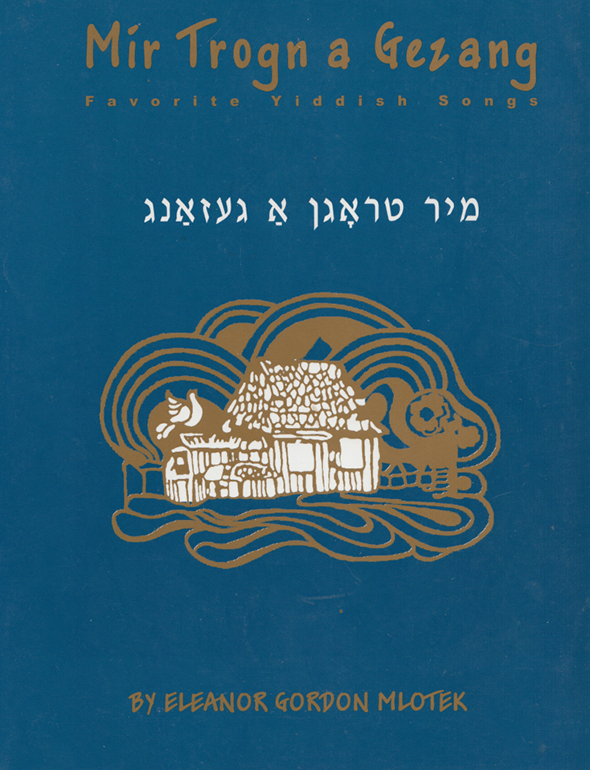Folklorized version of a song by Mikhl Gordon (1823-1890), author of such popular songs that are considered folk songs like Di Mashke, Di Shtifmuter, As Ikh Volt Gehat Dem Keysers Oytsres, Fun Der Khupe Tsu Der Stude, and others. Di Bord was originally published, like others, anonymously “fun a groysin khosid” in 1868 out of fear of the Hassidim. The author included with revisions in his second collection in 1889, under his real name. This song, written during the Haskalah period in Russia, pokes fun, through the personification of the beard, at the tragic reactions to changes in traditional practices and appearances. The folklorized version was collected and published by Chana Mlotek in 1951.

When Tshipe-Trayne came home,
she didn’t recognize her own husband –
his whole beard taken off;
she raised a heart-rending outcry.
Your beard, your beard, your beard for pity’s sake,
your beard, your beard, to hell with you!
Is this a man, or is it a boy?
Is this a female or a male?
How was I to expect, how could I have thought,
that my devout husband would actually cut off his beard?
Did the beard do you any harm?
Did it cost you exceptional expenses?
Did it demand food from you?
Oy gevald! I cannot get over this!
Last night I had a dream,
The whole beard, may it rest in peace;
hair here, there, everywhere,
and next to the beard lay a pair of scissors.
Az Tshipe-Trayne iz in shtub arayngekumen,
Hot zi ir eygenem man nit derkent —
Di gantshitshke bord aruntergenumen;
Hot zi gemakht a yomerlekh gevald.
REFRAIN:
Di bord, di bord, di bord zol mir zayn,
Di bord, di bord, in tatn arayn!
Tsi iz dos a man, tsi iz dos a bokher,
Tsi iz dos a nekeyve, tsi iz dos a zokher,
Tsi zol ikh dos trakhtn, tsi zol ikh dos klern,
Az mayn frumer man zol zikh di bord gor opshern?
Tsi hot dir di bord geton a roe?
Tsi hot zi dir gekost a spetsyele hotsoe?
Tsi hot zi fun dir gor gemont esn?
Oy gevald geshrign, ikh ken dos nit fargesn!
Nekhtn bay nakht iz mir gekumen tsu kholem
Di gantshitshke bord olehasholem;
A hor ahin un a hor aher —
Un lebn der bord iz gelegn a sher.
אַז טשיפּע-טרײַנע איז אין שמוב אַרײַנגעקומען,
האָט זי איר אײגענעם מאַן ניט דערקענט —
די גאַנטשיטשקע באָרד אַרונטערגענומען;
האָט זי געמאַכט אַ יאָמערלעך געװאַלד.
רעפֿרײן:
די באָרד, די באָרד, די באָרד זאָל מיר זײַן,
די באָרד, די באָרד אין טאַטן אַרײַן!
צי איז דאָס א מאַן, צי איז דאָס א בחור?
צי איז דאָס אַ נקבֿה, צי איז דאָס אַ זכר?
צי זאָל איך דאָס טראַכטן, צי זאָל איך דאָס קלערן,
אַז מײַן פֿרומער מאַן זאָל זיך די באָרד גאָר אָפּשערן?
צי האָט דיר די באָרד געטאָן אַ רעה?
צי האָט זי דיר געקאָסט אַ ספּעציעלע הוצאה?
צי האָט זי פֿון דיר גאָר געמאָנט עסן?
אױ, געװאַלד געשריגן, איך קען דאָס ניט פֿאַרגעסן.
נעכטן בײַ נאַכט איז מיר געקומען צו חלום
די גאַנטשיטשקע באָרד עליה השלום;
אַ האָר אַהין און אַ האָר אַהער —
און לעבן דער באָרד איז געלעגן א שער.
Song Title: Di Bord

First published in 1972, Mir Trogn A Gezang: Favorite Yiddish Songs was reprinted six more times (in 1977, 1982, 1985, 1987, 1988, 2000) due to popular demand. The songs in this anthology represent a sampling of beloved folk and well-known Yiddish songs, many of which are scattered in various song collections; some appear in very rare and inaccessible collections; and some were never before published. Folk songs comprise about a third of this volume and were selected mainly on the basis of popularity and sometimes for their historic significance. Needless to say, they are only representative of the vast, rich treasure of Yiddish folk material. The selection was made not only on the basis of personal preference, but in the knowledge they are favorites of many who sing these songs. Most of the songs represent the repertoire that was sung at Yiddish summer camps, May 1st demonstrations and at social gatherings. Many songs were introduced to American Jewry by Jewish immigrants who came to the United States after World War II, for whom these songs had been favorites in Poland and other East European communities destroyed by the Nazis.